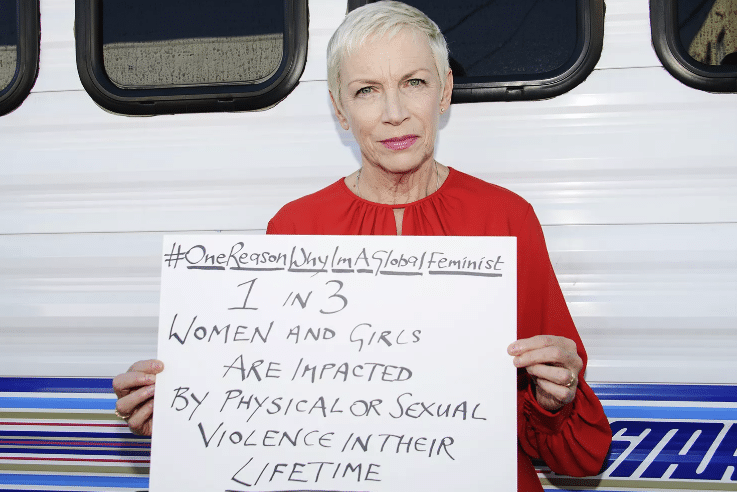Why am I a Global Feminist?
Opinion piece by Annie Lennox

As a younger woman in the early ’70s, it actually took me several years before I could identify with the term “feminist” as a self-descriptor.
When I wrote “Sisters Are Doin’ It for Themselves” back in 1985, I still didn’t feel I “deserved” to account for myself as a bonafide feminist, as I suspected my mild obsession with make-up and shoes might disqualify me from belonging to the club.
By that time I was confident (or naïve) enough to walk to the onstage podium and call for the women in the room to “Stand up if you’re a feminist” — wrongfully assuming that everyone would immediately rise to their feet in a unified outpouring of collective Sisterhood. I judged poorly. While one-half of the room stood up, the other 200 remained seated — awkwardly unsure as to what they should do with themselves.
Embarrassing? Just a little.
That experience taught me a lesson. Never assume anything. And even if I now suspect the reaction would be much more unanimous and enthusiastic these days, I’d be even more careful about jumping to projected conclusions.
Feminism needs to feel relevant and inclusive for all women and girls. It has to feel like part of all our lives, not something that only belongs to the most committed and radical among us.
In recent years, I’ve become more convinced than ever that feminism needs to be more accessible, understood and informed by women and girls, as well as men and boys, living in countries where the challenges and limitations are greatest.
Most especially for millions of human beings living in countries such as Afghanistan, where emancipation and empowerment are essential for progress, but where equal rights and opportunities are currently being rolled backwards at the speed of light.
Ask “those” women what greatest challenges are facing women and girls face right now and you might get very different answers from the responses you’d receive in Washington, London or Paris.
In Tehran and Kabul, they will tell you it is about supporting the teenage girls who are risking their lives and futures to campaign for their freedoms and basic human rights.
In Sri Lanka and Bangladesh, they will tell you it’s about the need to campaign for female garment workers to receive a living wage, safe working conditions, and fair treatment from their employers. And in countries all over the world, they will tell you it is about ending the physical or sexual violence that directly affects their lives and will affect 1 in 3 women in their lifetime.
If abused women had a country to themselves, the population would be equivalent to the whole of Europe and North America put together.
And yet when has the global epidemic of sexual violence ever been on the agenda at a G7 summit?
Fifteen years ago, I became founder of The Circle, an organisation dedicated to achieving equal rights and pay for women in every corner of the globe and ending the violence suffered by hundreds of millions every day.
Through our grassroots partners at the front line of that struggle around the world, we currently help thousands of individual women and girls every year. From the UN to the European Parliament, we advocate for the global changes that will make a positive difference to billions.
But above it all, The Circle exists to promote the concept of a Global Feminism that all women, everywhere can identify with and perceive as relevant to their daily existence.
It took me years to arrive at the understanding and realisation that Feminism must be identified and represented from a Global perspective.
Apart from the glass ceilings of board rooms and equal pay … let’s try to go for the right to live safely and securely, the right to a basic living wage and an education that will take us ALL to a life worth living.
This is why I am a passionate Global Feminist!
